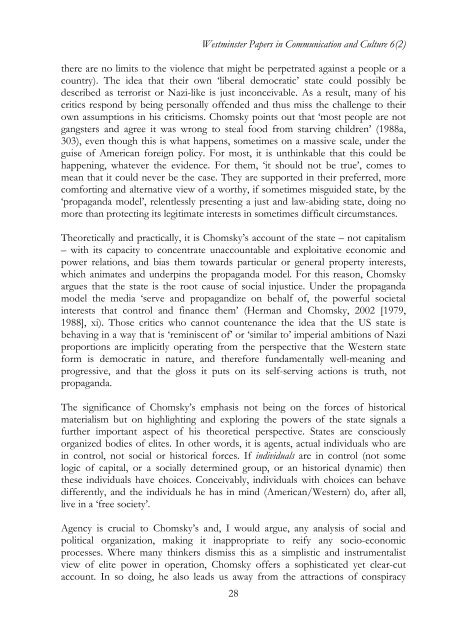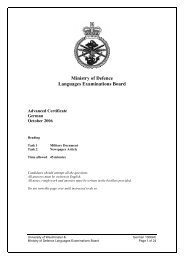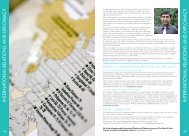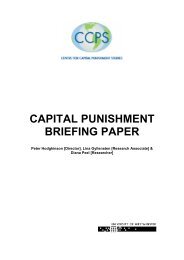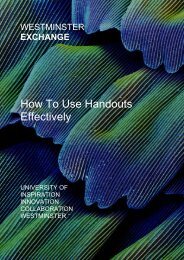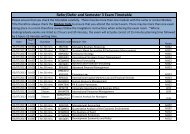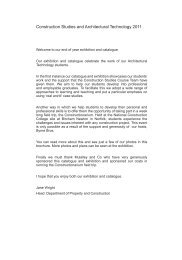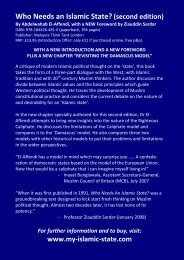Social Science, Rhetoric and Chomsky's Critique - Alison Edgley
Social Science, Rhetoric and Chomsky's Critique - Alison Edgley
Social Science, Rhetoric and Chomsky's Critique - Alison Edgley
You also want an ePaper? Increase the reach of your titles
YUMPU automatically turns print PDFs into web optimized ePapers that Google loves.
Westminster Papers in Communication <strong>and</strong> Culture 6(2)there are no limits to the violence that might be perpetrated against a people or acountry). The idea that their own ‘liberal democratic’ state could possibly bedescribed as terrorist or Nazi-like is just inconceivable. As a result, many of hiscritics respond by being personally offended <strong>and</strong> thus miss the challenge to theirown assumptions in his criticisms. Chomsky points out that ‘most people are notgangsters <strong>and</strong> agree it was wrong to steal food from starving children’ (1988a,303), even though this is what happens, sometimes on a massive scale, under theguise of American foreign policy. For most, it is unthinkable that this could behappening, whatever the evidence. For them, ‘it should not be true’, comes tomean that it could never be the case. They are supported in their preferred, morecomforting <strong>and</strong> alternative view of a worthy, if sometimes misguided state, by the‘propag<strong>and</strong>a model’, relentlessly presenting a just <strong>and</strong> law-abiding state, doing nomore than protecting its legitimate interests in sometimes difficult circumstances.Theoretically <strong>and</strong> practically, it is Chomsky’s account of the state – not capitalism– with its capacity to concentrate unaccountable <strong>and</strong> exploitative economic <strong>and</strong>power relations, <strong>and</strong> bias them towards particular or general property interests,which animates <strong>and</strong> underpins the propag<strong>and</strong>a model. For this reason, Chomskyargues that the state is the root cause of social injustice. Under the propag<strong>and</strong>amodel the media ‘serve <strong>and</strong> propag<strong>and</strong>ize on behalf of, the powerful societalinterests that control <strong>and</strong> finance them’ (Herman <strong>and</strong> Chomsky, 2002 [1979,1988], xi). Those critics who cannot countenance the idea that the US state isbehaving in a way that is ‘reminiscent of’ or ‘similar to’ imperial ambitions of Naziproportions are implicitly operating from the perspective that the Western stateform is democratic in nature, <strong>and</strong> therefore fundamentally well-meaning <strong>and</strong>progressive, <strong>and</strong> that the gloss it puts on its self-serving actions is truth, notpropag<strong>and</strong>a.The significance of Chomsky’s emphasis not being on the forces of historicalmaterialism but on highlighting <strong>and</strong> exploring the powers of the state signals afurther important aspect of his theoretical perspective. States are consciouslyorganized bodies of elites. In other words, it is agents, actual individuals who arein control, not social or historical forces. If individuals are in control (not somelogic of capital, or a socially determined group, or an historical dynamic) thenthese individuals have choices. Conceivably, individuals with choices can behavedifferently, <strong>and</strong> the individuals he has in mind (American/Western) do, after all,live in a ‘free society’.Agency is crucial to Chomsky’s <strong>and</strong>, I would argue, any analysis of social <strong>and</strong>political organization, making it inappropriate to reify any socio-economicprocesses. Where many thinkers dismiss this as a simplistic <strong>and</strong> instrumentalistview of elite power in operation, Chomsky offers a sophisticated yet clear-cutaccount. In so doing, he also leads us away from the attractions of conspiracy28


